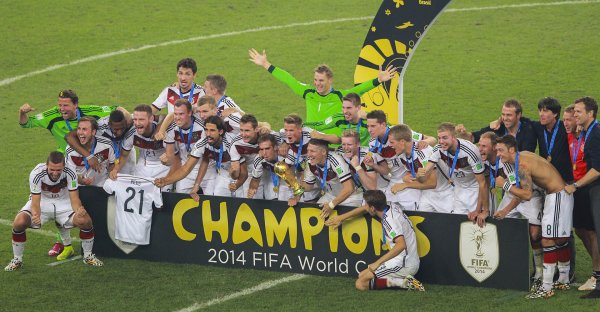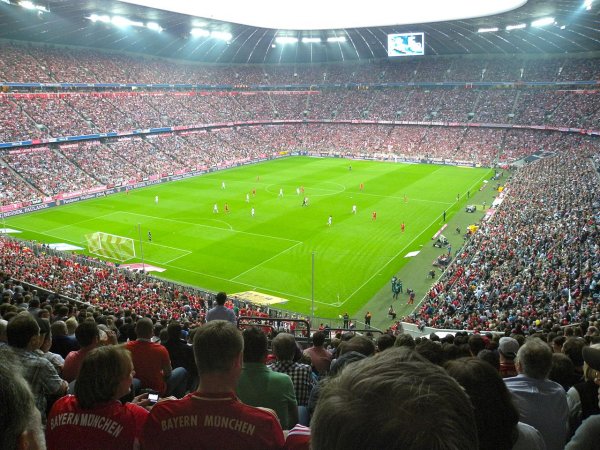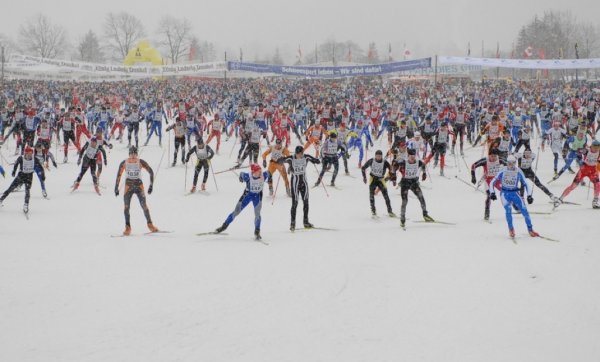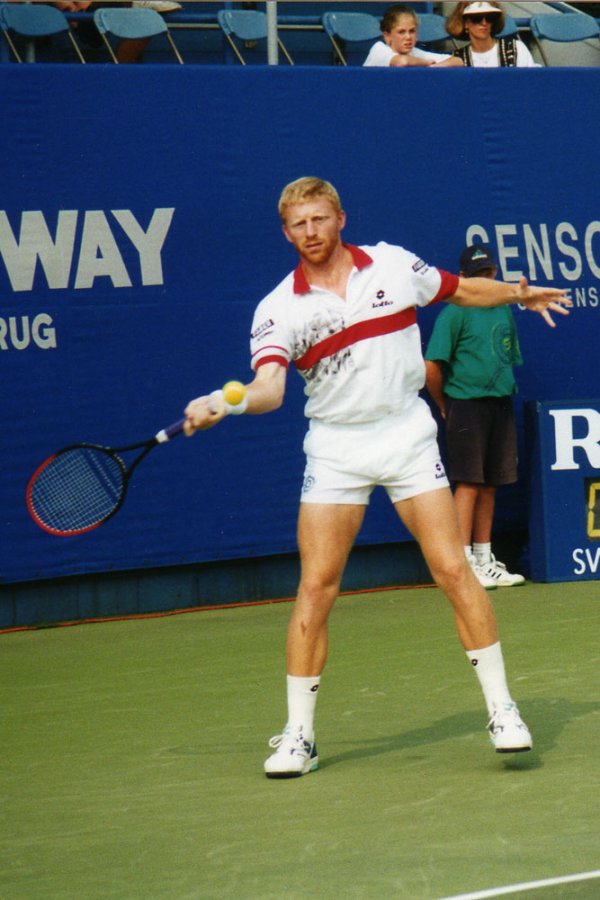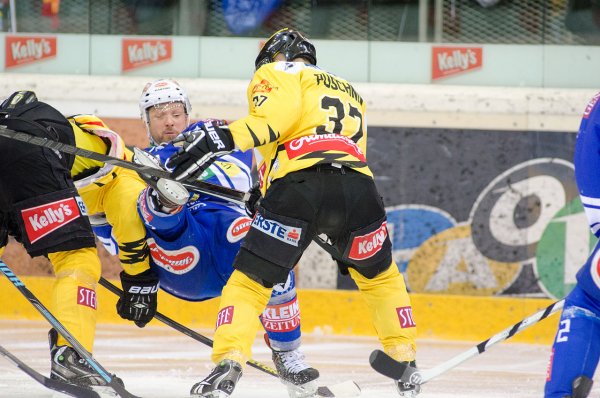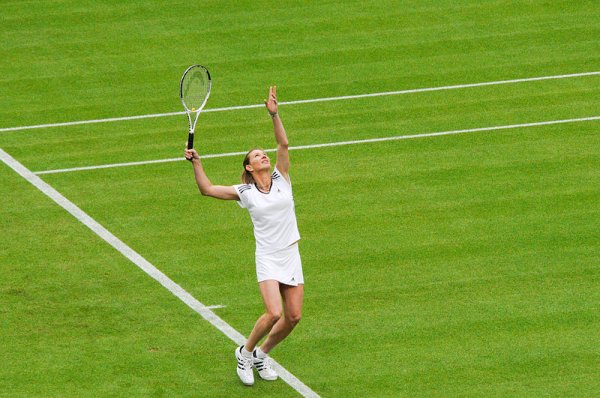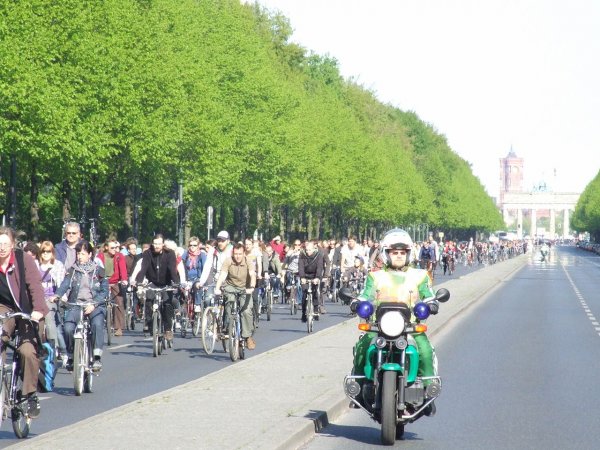Culture and Society: Sports
General
Soccer is by far the most popular sport played in Germany. There are opportunities to play soccer in thousands of Fußballvereine (soccer clubs) throughout the country. Germany has won soccer’s World Cup three times, most recently in 1990, and reached the finals four times. Germany’s Bayern Munich soccer club is one of the leading sports clubs in the world.
Tennis is another major sport that has become a status symbol in Germany, mainly due to the achievements of Boris Becker and Steffi Graff. Becker is a six-time Grand Slam singles champion, an Olympic gold medalist, and the youngest to ever win a men’s singles title at Wimbledon, a mark later broken by Michael Chang. Graf won 22 Grand Slam singles titles and 107 singles titles, ranking third for most singles titles won during the open era.
Other favorite sports activities in Germany include track and field events, volleyball, basketball, handball, ice and field hockey, and swimming. Motor sports are another popular sporting event. Favorite recreational sports include horseback riding, bicycling, skateboarding, sailing, golf, skiing, and shooting. Among winter sports, Germany is highly regarded for bobsledding events, having won the highest number of medals after Switzerland.
Individual Sport Participation
Personal fitness is an important part of German culture, with the country’s fitness market becoming the second largest in Europe. The innumerable gyms dotting the German landscape with state-of-the-art equipment is attracting a new type of fitness aspirant. According to a 2002 report, around five million Germans were members of fitness centers.
Germans across the age spectrum engage in various sports activities. Children participate in track and field events at a very young age. The most popular sport for both genders and all ages is soccer. Children, mostly boys, start playing soccer from a very young age. Tennis is another sport played from a young age. Favorite winter sporting activities include skiing, snowboarding, skating, and sledding. Germany has a large number of the elderly taking part in sports not only for the sake of their health but also for social interaction.
Germany has many facilities where people can go to play sports. These include private and semi-private golf courses, indoor and outdoor swimming pools, tennis courts, gymnasiums, sailing facilities, and other playing fields. There are thousands of amateur sports clubs with more than six million members that offer access to many sports. Germany has many ski resorts where people can enjoy the sport. The mountainous areas have hiking trails for the benefit of hikers.
Public sports halls in Germany charge fees to make use of their facilities. One example is the Olympic Village where all kinds of sports, fitness programs, and leisure activities are provided. A typical fees structure is that charged by the Olympic Ice Sports Center: three euros for a single ticket and 15 euros for a six-day ticket for adults. There is a concessionary fees structure for children and the disabled.
Private Sports Clubs
Private clubs and gyms have become increasingly popular. Sports and fitness programs have been promoted as a way to achieve a more desirable lifestyle. Membership in private sports clubs is open to everyone. However, membership in golf clubs may be restricted due to the high expenses involved.
Generally, membership fees are quite modest and affordable for most people. The reason being most of the people who run the clubs do so on a voluntary basis. The average monthly membership fees start from 20 euros to 100 euros for a gold card. In many clubs, once an existing member proposes you for membership, you pay a one-time initiation fee and an annual fee. Membership fees and other charges generate around 3.3 billion euros annually in the fitness industry.
Private Sports Clubs Listings:
Allgemeiner Deutscher Automobil-Club e.V. (ADAC)
Germany
Founded in 1903, ADAC is the largest automobile club in Europe with more than 15 million members. ADAC hosts the European Grand Prix, the 24 Hours Nürburgring, and many other races. ADAC’s "Yellow Angels," mobile mechanics in a fleet of yellow cars, offer assistance to motorists in trouble. ADAC also maintains a fleet of 36 helicopters, strategically placed to reach any location in 15 minutes, to provide medical rescue.
Automobilclub von Deutschland (AvD)
Germany
Organizer of the German Grand Prix, AvD is the smaller rival of the ADAC. The club was created in 1899 by motor enthusiasts and was originally known as Deutsche Automobilclub. AvD has a long automobile tradition and is known worldwide.
FC Gelsenkirchen Schalke 04 (FC Schalke 04)
Seriousness Kuzorra way 1
45891 gel churches
Germany
FC Schalke 04 is the second largest sports club in Germany. This very successful and popular soccer club also has departments for football, basketball, table tennis, handball and track and field. The club’s home base is Gelsenkirchen.
Hamburger Sport-Verein (HSV)
Sylvesterallee 7
22525 Hamburg
Germany
Established in the year 1919, HSV plays in the Bundesliga. The club is primarily known for its soccer teams. Its women’s soccer team plays in the first Federal League. Likewise, the club’s first women’s ice hockey team plays in the first Federal League. The other sports associated with the club are basketball, baseball, bowling, golf, cricket, handball, gymnastics, roller hockey, ice hockey, carats, rugby, track and field, tennis, swimming, tournament dance, and volleyball. The HSV has 40,000 members, making it the third largest sports association in the country.
Startgemeinschaft Essen (SG Essen)
North Rhine-Westphalia
Essen
Germany
SG Essen is the union of swimming departments in 13 sports clubs. The association is based in Essen in the North Rhine-Westphalia region of Germany. The women’s team plays in the first Bundesliga (National League) and the men’s team plays in the second Bundesliga.
School Sports
Sports and athletics is part of physical education and intramural sports in German schools. Competition between school teams is rare. Such competitions tend to take place between clubs. Many German universities offer sports as a subject to be studied. The Research and Devolopment Institute for Sports Equipment is actively involved in fostering innovations in sports equipment.
Some of the sports offered in German schools include soccer, tennis, basketball, and rugby. After school hours and during lunch time are the periods when students can engage in various sports activities.
German universities have dedicated sports communities on their campuses and regularly organize tournaments. University students can use various facilities on campus like the sports hall, swimming pool, fitness center, and tennis courts.
University sports club members participate in national and international competitions. Students are free to set up their own sports clubs on campus.
The German University Sports Federation is the umbrella organization for University sports bodies. Its membership includes over 1,600,000 students and 400,000 staff. The Federation organizes national and international events including the World University Championships. It conducts tournaments in over 50 sporting events. The top sporting event takes place after the Olympics, called the Summer World Student Games, with 5,000 participants from over 100 countries.
Cheerleading, incorporating elements of dance and gymnastics, is a major tradition surrounding collegiate sports in Germany.
Professional Sports
Soccer is the dominant spectator sport in Germany. Professional soccer games draw an average of 25,000 fans per game. Some soccer clubs like Borussia Dortmund and FC Schalke 04 attract up to 60,000 fans during home games in the German Bundesliga. Millions watch soccer games on television during international games. Thanks to the success of Michael Schumacher, Formula-1 race car driving also has become a popular spectator sport.
Professional athletes are regarded as heroes and celebrities in Germany, with some achieving cult status. Franz Anton Beckenbauer, coach, team manager, and former player of the national soccer team, is one of the most famous sports personalities in the country, nicknamed der Kaiser (the Emperor)and considered the greatest German soccer player of all time. Beckenbauer help Germany win the World Cup as captain in 1974 and as manager in 1990. Michael Ballack is the current captain of the German soccer team and a popular soccer player. Steffi Graff, winner of 22 Grand Slam singles titles, and Boris Becker, winner of six Grand Slam singles titles, are famous tennis players. Michael Schumacher is a race car driving legend, winning seven world championships. Jurgen Klinsman, a member of the 1990 World Cup championship team, and Lothar Herbert Mathaeus, captain of the 1990 World Cup championship team and also FIFA World Player of the Year in 1990, are other famous soccer players. Oliver Kahn, the famous goalkeeper, played for the German National Soccer team from 1995 to 2006 and still plays for Bayern Munchen.
Popular and Dominant Teams - Soccer
FC Bayern Munich is the most successful club in German soccer history, with 20 Bundesliga titles and 14 cups to its credit.
Women
Out of the 27 million members of the 80,000 sports associations in Germany, 10 million are girls and women. Women have particularly made their mark in tennis, track and field, and winter sports. However, women’s soccer teams have not made much of an impact. There has been progress in recent years in promoting a women’s soccer league.
Major Spectator Sporting Events
Ironman Germany (Triathlon)
Date: July
Location: Frankfurt, Germany
Description: Ironman Germany is a European triathlon championship viewed by about 350,000 spectators. Over 2,000 athletes from more than 40 countries participate in this event. The competition includes a 42.2 km run, a 180 km bicycle race and a 3.8 km swim.
Rund um den Henninger-Turm (Frankfurt Grand Prix) (Cycling)
Date: May
Location: Frankfurt, Germany
Description: This sporting event is a famous bicycle race that begins in Frankfurt and winds through the Taunus mountain range. The top names in bicycling participate in this race, dubbed the Frankfurt Grand Prix, involving 1,500 meters of grueling vertical climbing in the complicated Taunus Mountains. The race ends in the center of Frankfurt with three laps of 4.5 kilometers.
Qatar Telecom German Open (Tennis)
Date: May
Location: Berlin, Germany
Description: This is an International WTA Tier I Tennis Championship for women in which top tennis players from around the world participate. This tournament is played at Berlin’s Rot Weiss where the center court can accommodate up to 7,000 spectators. Some of the past winners in this tournament are Steffi Graf, Chris Evert, Arantxa Sanchez Vicario, Monica Seles, and Martina Hingis.
Deutsche Bank Players Championship of Europe (Golf)
Date: July
Location: Gut Kaden Golf Club or Golf Club St Leon Rot
Description: This is one of the biggest golf tournaments in Germany in which many of the top golf players in the world participate. This championship has a special significance for European players as the top ten players can directly enter the European team to play for the Ryder Cup against the U.S. The prize fund for this tournament is 3.9 million Euros, making it the top event of the European tour.
BMW International Open (Golf)
Date: June
Location: Munich
Description: This is another famous men’s European tournament attracting the elite golfers. It is a part of Germany’s European Tour which also includes the Mercedes-Benz Championship and the Deutsche Bank Players Championship of Europe. It has a prize fund of €2 million.
Mercedes-Benz Championship (Golf)
Date: September
Location: Venues all over Germany
Description: This is also part of Germany’s European Tour men’s golf championships, hosted by Bernhard Langer, the country’s best golfer. Only players who have won the 2007 European Tour and those on the top 75 list of the Official World Golf Rankings or the top 60 list of the European Order of Merit can participate in this tournament.
Kiel Week Regatta
Date: last week of June
Location: Kiel, Germany
Description: This is one of the top sailing events in the world where sailors in different kinds of dinghies, yachts, and ships take part. The event starts with the traditional ringing of the bell at the Town Hall Square (Rathausplatz) and then a ship’s horn. Around three million people visit this event every year to watch the 2,000 ships and their 5,000 sailors.
German Motorcycle Grand Prix
Date: July
Location: Sachsenring
Description: This is one of the fastest and most competitive biking races in the world.
Formula One: German Grand Prix
Date: July
Location: Nürburgring
Description: This is part of the FIA Formula One season, attracting drivers from across the world. The course is 17.4 miles long.
EuroSpeedway Superbike Championship
Date: September
Location: Eurospeedway Lausitz
Description: This is one of the top motorbike races in the world, almost on par with Moto GP. Production model bikes are used in this race unlike the bikes in the Moto GP, which uses special custom-made bikes.
Deutschland Tour (Cycling)
Date: August
Location: Karlsruhe
Description: The Deutschland Tour is a cycling race that goes across the whole country, covering a total distance of 1.315 km. It starts in Saarbruecken and covers Chiemgau in Bavaria, the Tirolean Alps, Lake Constance, the Black Forest, Rhein-Neckar, Vorderwesterwald, and ends in Hannover. Around 20 teams with eight members each participate in this race.
Berlin Marathon
Date: September
Location: Berlin
Description: Started in 1974, this 36-mile marathon sees participation from nearly 60,000 runners from around 100 countries. Millions gather to watch the race as well as enjoy live bands and food along the way.
Cologne Marathon
Date: October
Location: Cologne
Description: This marathon is limited to 17,500 runners and six hours. Inline skating, hand biking, and wheelchair runs are some of the categories.
Berlin Street Run
Date: August
Location: Berlin
Description: This is a fun run half marathon that covers 21 kilometers. There is also the 10km race, a children’s race of 800 meters.
Frankfurt Marathon
Date: October
Location: Frankfurt, Germany
Description: Thousands gather at the Frankfurt Trade Center in a party-like atmosphere to cheer the runners who run all the way to Hohenstaufenstrasse. A post marathon pasta party is held after the race for all the competitors.
Golden League Athletics - ISTAF (Berlin) (Track and Field)
Date: September
Location: Olympiastadion, Berlin
Description: Started in 1998, this is a part of the Golden League. Some of the world’s top athletes join together and also vie for the 20kg of gold bars by winning all the Golden League events.
Deutsche Eishockey-Liga (Ice Hockey)
Date: September and March
Location: Eissporthalle Frankfurt
Description: This is the top ice hockey league, taking the place of the Eishockey Bundesliga.
Bundesliga (Soccer)
Date: Early August to late May
Location: venues all over Germany
Description: The Bundesliga is the top soccer league in Germany. There is also the Tier II second Bundesliga, also known as the Zweite Liga (Second League). The top three teams in the second league are promoted to the Bundesliga. The last three teams in the Bundesliga are relegated to the second league. No games are held from mid-December to the end of January. Games are played only on Fridays, Saturdays, and Sundays.
DFB-Pokal (German Cup) (Soccer)
Date: N/A
Location: Venues all over Germany
Description: This is a top knockout tournament and the most important soccer tournament after the Bundesliga. All 36 teams from the Bundesliga,and second Bundesliga and the four clubs that have been relegated to the Regionalliga enter the first round of the German Cup directly. Amateur leagues and the semi-professional Regionalliga play qualification games. There are a total of 64 teams in the tournament.
Copyright © 1993—2025 World Trade Press. All rights reserved.

 Germany
Germany 